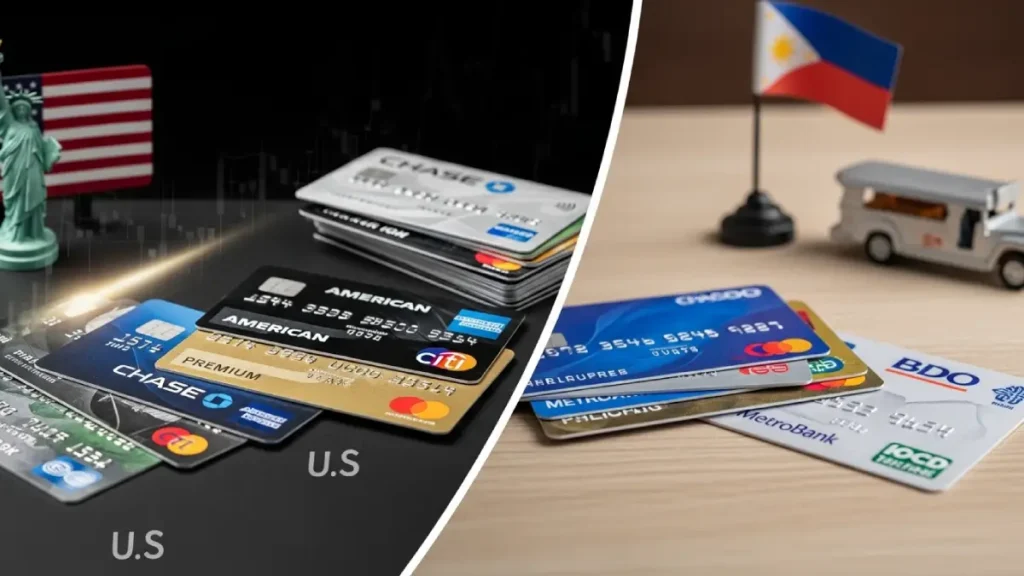Local Cards Trap You. U.S. Credit Cards Free You
Filipino credit cards often pay as little as 0.3 % cashback and may charge around 1.85 % in foreign transaction fees.
By contrast, U.S. cards routinely offer 1.5 %–5 % unlimited cashback, generous signup bonuses and zero foreign transaction fees.
This guide explains why more Filipinos are exploring U.S. cards and how to legally access them focusing on eligibility, real benefits and potential pitfalls.
Navigate to What Matters
💳 Section 1 – What Makes U.S. Credit Cards So Different?
Filipinos are familiar with local credit cards from BPI, Metrobank, UnionBank and others. While these products are adequate for domestic use, they often fall short in areas that matter to travelers, online shoppers and freelancers. Below is a side‑by‑side comparison that summarises the key differences.
| Feature | U.S. Credit Cards | Local PH Credit Cards |
|---|---|---|
| Cashback & Rewards | 1.5%–5% unlimited cashback on most purchases; rotating categories can reach 5% such as groceries and travel Learn more | Often capped; general rates are 0.2%–0.5%. BPI’s cashback card offers only 0.3% on other retail spend |
| Signup Bonuses | Common to receive US$200–US$750 after minimum spend; e.g., Freedom Unlimited with US$200 after US$500 in 3 months Learn more | Rare or low-value welcome gifts; local cards seldom offer cash bonuses. |
| Foreign Transaction Fees | Some cards charge 0%; fee cards usually cap at 3%. Example: Reflect lists 3% Learn more | Typically 1%–3.5%; BPI charges 0.85% + 1% assessment |
| Travel Protections | Trip cancellation, baggage delay and rental CDW included in many cards Learn more | Limited or absent; separate insurance often needed. |
| Global Acceptance | High acceptance with Visa/Mastercard and Amex; works with Apple Pay, Google Pay and PayPal Learn more | Some local cards may be declined abroad, especially in the U.S./Europe. |
| 0% APR on Purchases | Many offer 12–21 months; Wells Fargo Reflect has 21 months Learn more | Unavailable; interest is charged from posting date. |
| Credit Limit Adjustments | Often automated in-app; fast increases with usage Learn more | Manual process with calls and paperwork; slower. |
| Integration with Fintech | Seamless with PayPal, Apple Pay, Google Pay, Amazon Learn more | Limited; some support GCash or PayMaya. |
| Customer Support | 24/7 chat and phone Learn more | Business hours; long wait times common. |
Table: U.S. vs Local (Philippines) Credit Cards

Neutral Technical View: U.S. credit cards are structured as consumer acquisition tools in a competitive market, so banks offer high rewards and long intro periods. Local cards cater to a smaller market with less competition, making lower rewards more sustainable. However, the figures in the table clearly show a performance gap.
Devil’s Advocate: High U.S. rewards often come with annual fees and complex terms. Some cards require excellent credit history, and misuse can lead to debt. Local cards might seem modest but they at least reduce the temptation to overspend.
Furthermore, foreign transaction fees exist on certain U.S. cards (e.g., Wells Fargo Reflect’s 3% conversion fee), so not every U.S. card is “free” for travel.
Constructive Strategic Takeaway: If you have disciplined spending habits, a U.S. card can maximise returns on every purchase and reduce fees when shopping online or travelling. Evaluate each card’s annual fee, rewards categories and your spending patterns.
Local cards still have a place for building a credit history in the Philippines or handling purely domestic expenses.

-

 Best Picks1 year ago
Best Picks1 year agoDriving Insurance: Get the Best Car Coverage Without Overpaying
-

 Best Rewards7 months ago
Best Rewards7 months agoBest rewards credit cards in 2025 for everyday use
-

 Personal Growth & Mindset1 year ago
Personal Growth & Mindset1 year agoTed Lasso Effect: 5 Goal-Setting Secrets You Must Know
-

 Personal Growth & Mindset1 year ago
Personal Growth & Mindset1 year agoMachado de Assis: This Viral TikTok Explains Why You Need to Read ‘The Posthumous Memoirs of Brás Cubas’ Now
-

 Career & Success1 year ago
Career & Success1 year agoChallenges of Not Having Goals: 5 tips to help you get started
-

 AI & Future Trends1 year ago
AI & Future Trends1 year agoAI in Time Management 2024: A New Era of Productivity for Business Leaders







